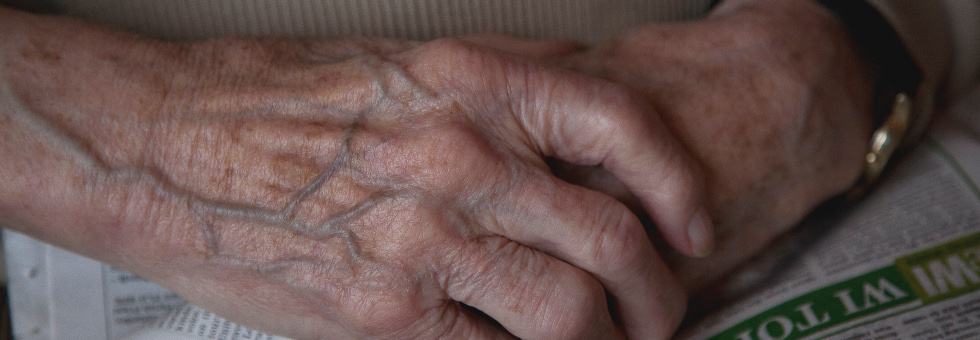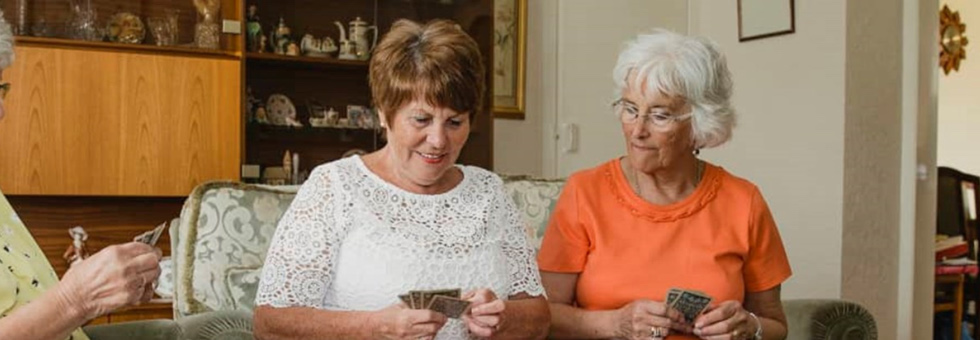Contents
This stage of the case study provides the following information.
- The Personal History sets out what is happening for Don and Madge.
- Values and Ethics – Relating to holistic and strengths-based work
- Law and policy – Relating to: Prevention; Support for carers
- Knowledge, Evidence and Good Practice – Relating to: Living with multiple long-term conditions; Health Informed practice
- Skills – Relating to: Person-centred assessment; Prevention
- Activities – Relating to: Local Authority resources; Living with long-term conditions; Assessment
- Additional resources – Relating to: Health conditions that can be experienced in older age; Healthy ageing
Personal History
Over two years Don’s health has deteriorated significantly and his osteoarthritis has worsened. His joints are very stiff in the morning and evening. He finds it harder to get about and to bath and dress. Madge lays out his clothes and helps him to put on his socks, button his shirt and get his jumper over his head. She also helps him to undress in the evening and is generally on hand to offer practical assistance.
In 2013 Don was diagnosed with type-two diabetes and hypertension (high blood pressure) and had three distressing episodes of prostatitis. In the summer of 2014 Don developed a leg ulcer which is dressed, treated and monitored by the community nurse at the local GP surgery.
Although Don still enjoys his long-standing hobby and remains devoted to his wife, he has felt emotionally low during this period. The episodes of prostatitis, combined with diabetes, new medication and expectations that he change his lifestyle, are challenging. The painful leg ulcer has had an impact on his wellbeing and he feels that he is not as intellectually ‘sharp’ as he used to be. He has had one or two dizzy spells which he described as ‘funny turns’ and put down to his age and to feeling tired.
Because of his diabetes Don now goes to a podiatrist for foot and nail care and his eyesight is monitored regularly. With background retinopathy, he has been told that his eyesight is at risk. He worries that he is putting too much pressure on Madge and that, if his health continues to deteriorate, he will be a burden to her. Always a private and reserved man, he keeps his worries to himself.
Madge still enjoys her volunteering activities, but finds it hard to garden during the persistent summer heat. Feeling ‘out of sorts’ she visits the GP who tells her that she has hypertension and prescribes medication. She feels tired when freezing and preserving her garden produce and gives a lot of it away to friends and neighbours, to avoid dealing with it.
Don’s leg ulcer has been painful and slow to heal and at times he has felt irritable. Sometimes he takes his frustration out on his wife by being sharp and impatient with her. Later he feels remorseful as he knows that Madge deserves only his love and respect. The couple have had cross words about Don’s diet. Madge has encouraged Don to eat sensibly and to restrict the wine he drinks at dinner, but he feels that he deserves treats, as he has such a lot to put up with. His blood sugar levels are causing concern so the Diabetes Nurse is monitoring Don more closely and his medication has been altered. His eyesight has continued to deteriorate and in September 2014 it was confirmed that he had developed maculopathy. Don is worried about how he will cope if he loses his sight completely. On his worst days he feels that he is losing everything that has shaped his sense of self: his strength, his practical abilities, his expertise in steam engines and being a good provider.
As the start of the Autumn term approaches, Madge tells the Head Teacher that she will have to stop her morning session and switch to the afternoon. This fits better with her need to be available for Don in the morning, as she often finds it exhausting getting him ready.
Values and Ethics
As the couple’s health problems increase, it is important to retain a whole-person approach that focuses on strengths, as well as areas of difficulty, and considers the impact of social and environmental factors. Resilience in late life is not just about personality and motivation, but also about the social and material circumstances that enable or prevent older people from functioning as they would choose (Stephens et al. 2015)
Reference
- Stephens, C. Breheny, M. and Mansvelt, J. (2015) ‘Healthy ageing from the perspective of older people: A capability approach to resilience’, Psychology and Health, 30(6):715-731.
Law and Policy
a) Prevention
Don is now living with several serious long-term health conditions and Madge is providing increasing care and support. She also has hypertension and is often tired and less able to participate in the activities she enjoys.
Preventing or delaying the development of needs for care and support and reducing needs that already exist is a key principle underpinning the Care Act 2014. This principle of prevention requires that:
‘At every interaction with a person, a local authority should consider whether or how the person’s needs could be reduced or other needs could be delayed from arising. Effective interventions at the right time can stop needs from escalating, and help people maintain their independence for longer’ (DH, 2016: 1.14c)
Under the Care Act 2014 (s.2) the local authority has a duty to provide or arrange for the provision of services, facilities or resources to prevent needs for care and support. Early intervention by care and support systems is seen as key to preventing need and delaying deterioration wherever possible (DH, 2016). Three distinct approaches to prevention, primary, secondary and tertiary, are described in the statutory guidance. Importantly, these should be regarded not as discrete and separate but overlapping and relevant in different circumstances. The primary level might include schemes to promote healthy living, to develop age friendly communities or to reduce isolation. The secondary level relates to more targeted interventions for individuals at increased risk of developing care and support needs, for example falls clinics and aids and housing adaptations. On the evidence available it is likely that Don would now fall within the scope of tertiary prevention:
‘These are interventions aimed at minimising the effect of disability or deterioration for people with established or complex health conditions, (including progressive conditions, such as dementia), supporting people to regain skills and manage or reduce need where possible’ (DH, 2016, 2.9).
Tertiary prevention is also relevant for Madge, as his carer:
‘Tertiary prevention services could also include helping improve the lives of carers by enabling them to continue to have a life of their own alongside caring, for example through respite care, peer support groups like dementia cafés, or emotional support or stress management classes which can provide essential opportunities to share learning and coping tips with others’ (DH, 2016, 2.10).
The couple would also be eligible for an assessment of their care and support needs, as ‘local authorities must undertake an assessment for any adult with an appearance of need for care and support, regardless of whether or not the local authority thinks the individual has eligible needs’ (DH, 2016, 6.13). The importance of prompt assessment is reinforced in guidelines from the National Institute for Health and Care Excellence (NICE) which recommend that health and social care practitioners consider referring older people with multiple long-term conditions for an assessment as soon as it is identified that they may need social care and support (NICE, 2015).
Care Act 2014 s.2 Preventing needs for care and support
(1) A local authority must provide or arrange for the provision of services, facilities or resources, or take other steps, which it considers will:
(a) contribute towards preventing or delaying the development by adults in its area of needs for care and support;
(b) contribute towards preventing or delaying the development by carers in its area of needs for support;
(c) reduce the needs for care and support of adults in its area;
(d) reduce the needs for support of carers in its area.
(2) In performing that duty, a local authority must have regard to:
(a) the importance of identifying services, facilities and resources already available in the authority’s area and the extent to which the authority could involve or make use of them in performing that duty;
(b) the importance of identifying adults in the authority’s area with needs for care and support which are not being met (by the authority or otherwise);
(c) the importance of identifying carers in the authority’s area with needs for support which are not being met (by the authority or otherwise).
b) Support for Carers
Under the Care Act 2014 Madge, as a carer, would now be on a similar footing to Don in terms of her rights to assessment and support (Carers UK, 2015). The NICE guidelines reinforce this position with the recommendation that any assessment of the carer’s needs should:
- recognise the complex nature of multiple long‑term conditions and their impact on people’s wellbeing
- take into account carers’ views about services that could help them maintain their caring role and live the life they choose
- involve cross‑checking any assumptions the person has made about the support their carer will provide (NICE, 2015).
Although carers have been entitled to an assessment of their needs and ability to continue in their caring role since the 1995 Carers (Recognition and Services) Act, their needs have often been overlooked. The extension of their rights under the Care Act 2014 is intended to address difficulties and tensions in the process of assessment for carers. These include: the low priority accorded to carer assessment; the narrow focus of assessment on personal care to the neglect of the impact of the caring role on other aspects of the carer’s life; the failure to capture the often reciprocal nature of caring and any assumption that the carer is willing to continue providing care (Seddon and Robinson, 2015).
References
- Carers UK (2015) Care Act 2014 and carers: opportunities for change, Briefing published 31st March, 2015.
- Department of Health (DH) (2016) Care and Support: Statutory Guidance Issued under the Care Act 2014 (Chapter 2: Preventing, Reducing or Delaying Needs).
- National Institute for Health and Care Excellence (NICE) (2015) Older people with social care needs and multiple long-term conditions, NICE Guidelines NG 22.
- Seddon, D. and Robinson, C. (2015) ‘Carer assessment: continuing tensions and dilemmas for social care practice’, Health and Social Care in the Community, 23(1):14–22.
Knowledge, Evidence and Good Practice
a) Living with multiple long-term conditions
We know from survey evidence that older people tend to evaluate their health status in different ways from younger people. For older people what matters is the ability to function effectively and autonomously, rather than the presence or absence of disease (Victor, 2010).
Don and Madge have made adjustments to enable Don to remain active and engaged, despite progressive osteoarthritis. But now Madge has hypertension and Don has additional long-term conditions which require medication, monitoring and life-style changes. Their deteriorating health is likely to compromise Madge’s ability to provide support for Don and to have a significant impact on their physical and psychological wellbeing.
Evidence from qualitative research studies provides insights into the variability of concepts such as wellbeing and resilience in the context of long-term morbidity in later life. For example, a study of people with osteoarthritis and chronic joint pain found that the meaning and impact of pain for each individual is dependent on psychological, social and environmental factors and that resilience is:
‘being able to accommodate and adapt to physical changes and fluctuations in health and wellbeing in order to sustain what is important in life and for a valued sense of self’
(Richardson et al., 2013, p.1493).
This understanding of resilience has important implications for practice in health and social care. If the individual’s own approach to managing their condition provides the starting point for any support offered, this helps to avoid undermining the person’s sense of self. Paying attention to the things that matter most to the individual is also essential, as small interventions or changes in this area can have a significant impact on quality of life. Although older people with multiple conditions express common needs for physical, psychological and social wellbeing, their preferences and views about what is really important in life are as diverse as any other adult grouping (Katz et al 2011).
There is also evidence that the experience of long-term conditions is gendered, that men and women tend to perceive and respond to the threat to self in different ways. Don is having difficulty adjusting to his declining health. He feels that he is not the man he was – his sense of self is threatened. A study of older people with multiple morbidities found that older men were more likely to express strong frustration in response to bodily changes that contravened masculine norms of invulnerability, physical strength and toughness. Women, by contrast, conveyed dismay, sadness and loss at changes in their appearance and ability to fulfil traditional feminine roles such as caring for and nurturing others (Hurd Clarke and Bennett, 2013).
Some strain is apparent in the relationship between Madge and Don with both of them anxious and under pressure. A study of midlife and older heterosexual couples where one or more partners is health impaired reveals interesting gender differences in the provision and receipt of emotional work. A key finding is that whereas men may engage in emotional work when their wife’s health is impaired, women are likely to take responsibility for emotional work irrespective of their own health status (Thomeer et al., 2015).
Guidance from the National Institute for Health and Care Excellence Guidelines highlights the gaps in our understanding of people’s experience of multiple long-term conditions and how these impact on their life. The guidance calls for more qualitative research into:
- the experiences of older people in the UK living with multiple long‑term conditions and how their conditions affect them over time and at different stages of their life
- how a person’s multiple long‑term conditions interact with each other and how this affects the person over time
- the priorities, meanings and preferences of older people living with multiple long‑term conditions.
(NICE, 2015)
b) Health Informed practice
The body is central to our understanding of ageing and of how older people experience their daily life. Health issues feature prominently in the assessment of care and support needs. So sound practice requires an awareness of the problems and risks associated with common late life health conditions and how these may be prevented or managed, as well as an understanding of the impact of psycho-social factors in late life (Ray and Phillips, 2012).
For example, the foot problems associated with diabetes pose a risk to Don’s mobility and lead, in the most serious cases, to amputation. Clear and evidence based information relating to long-term conditions is available from the Guidelines produced by NICE. Each guideline has a section with information for the general public which is useful for non-medical professionals as well as service users and carers.
To learn more about diabetic foot problems prevention and management visit the NICE advice pages online.
Using the menu in the left hand column you can find information relating to specific aspects of diabetic foot care and further sources of advice and support.
As someone who is taking medication for several health conditions, Don is also at risk of problems arising from polypharmacy. So it is important, in any assessment or review with Don, to check that he is seeing his GP and that his medication is reviewed regularly.
Further useful sources of information for older people, carers and professionals about specific long-term health conditions are listed under Button 5.
References
- Hurd Clarke, L. and Bennett, E. (2013) ‘You learn to live with all the things that are wrong with you: gender and the experience of multiple chronic conditions in later life’, Ageing and Society, 33(2):342-360.
- Katz, J., Holland, C., Peace, S., & Taylor, E. with Blood, I. (2011) A Better Life — What Older People with High Support Needs Value, York: Joseph Rowntree Foundation.
- Ray, M. and Phillips, J. (2012) Social Work with Older People (5th ed.) Basingstoke: Palgrave Macmillan/BASW.
- Richardson, J.C., Grime, J.C. and Ong, B.N. (2014) ‘Keeping going: chronic joint pain in older people who describe their health as good’, Ageing and Society, Vol 34(8):1380-1396.
- Thomeer, M.B., Reczek, C., Umberson, D. (2015) ‘Gendered emotion work around physical health problems in mid- and later-life marriages’, Journal of Aging Studies, 32:12-22
- Victor, C. (2010) Ageing, Health and Care, Bristol: The Policy Press.
Skills
Madge and Don are finding it more difficult to manage day to day life and their health status and quality of life are under threat. Don, in particular, is having difficulty in adjusting to his deteriorating health and Madge is providing increasing care and support.
A person-centred approach to assessment is needed to identify what really matters to Madge and Don, how best to support their preferred coping strategies and, if necessary, to introduce further support mechanisms and resources that are acceptable to the couple. Again this will require skills in listening; asking good questions; weighing and sifting information; demonstrating understanding and empathy, showing interest in and respect for the couple in their social and cultural context.
Preventing deterioration in Madge and Don’s health and wellbeing requires awareness of the risks and challenges that relate to their particular conditions and circumstances and willingness to take action if appropriate. Social workers should take the lead in managing positive interventions that prevent deterioration in health and wellbeing (Knowledge and Skills Statement for Social Workers in Adult Services, DH, 2015).
Reference
Department of Health (DH) (2015) Knowledge and Skills Statement for Social Workers in Adult Services.
Activities
Local authority resources
The Local Government Association website is a mine of information on developments in English local authorities. Go to the Care Act Local Practice Page.
The map on this page provides links to case studies and local practice relating to different themes. Select the work stream ‘General Duties – Prevention’ and have a look at the case studies marked on the map. At the time of writing there are just 2 – Suffolk and Thurrock.
Then select ‘First Contact and Identifying Needs’ and explore the case studies marked. At the time of writing there is only 1 – Nottinghamshire.
You could also explore case studies in the remaining work streams: Information and Advice and Person Centred Care and Support Planning.
As you read the case studies:
- Think about how these developments compare with practice in your local authority
- Note which case studies relate to prevention – you will find them across the work streams
- Make a note of any useful learning points from this activity.
Living with long-term conditions
Living with long-term conditions is challenging. Findings from research suggest that resilience in this context is about being able to accommodate and adapt to changes and fluctuations in health and wellbeing so as to sustain what most matters for the individual concerned (Richardson et al., 2013).
Think of an older person you know personally, or in your practice, who has demonstrated resilience in living with long-term conditions.
- What is it that makes you describe them as resilient?
- What do you think you have learned from them?
- Has knowing this person affected your practice in any way? If so, how?
- Take a few minutes to note down your thoughts
- Watch the video to find out about how Alanna Shaikh, a global health expert whose father has Alzheimers disease, is using that experience to prepare for the possibility of getting the disease herself.
When you have finished, take a moment to reflect again on the person you were thinking about before. Are there any more learning points you might draw from knowing them?
Assessment
Identifying what really matters to an older person is essential for a person-centred approach to assessment. Katz et al (2011) have developed a model which distinguishes between the things that older people want and value and the factors that hinder or help them to access these things.
To see this visit the Joseph Rowntree Foundation website. Scroll down to the bottom of the page to download the report A Better Life: what older people with high support needs value. You will find the model on p.41.
The authors suggest that the model can be used in practice with older people to focus ‘attention on what can be done differently to help older people with high support needs achieve and retain the things they value in life, rather than simply assuming that their individual social and/or medical conditions will inevitably place many experiences out of reach’ p.41).
Looking at the outer circle – what I want and value – do you routinely explore these elements when you do an assessment with an older person?
Now look at the inner circle – what hinders/helps me – how many of these factors do you routinely include in an assessment discussion?
Could this model enhance your approach to assessment? Note down your thoughts.
For more information on arthritis see Arthritis Care.
For more information on Diabetes see Diabetes UK
And for information about complications associated with Diabetes.
The incidence of diabetes is higher in black and ethnic minority communities than it is in white communities, for more information see Black and Ethnic Minority Diabetes Association (BEMDA).
For more information about leg ulcers see the Leg Ulcer Charity.
For more information about hypertension see Blood Pressure UK.
Prostatitis is not a cancerous condition. However the website for Prostate Cancer UK has useful information on this condition.
To discover more about patient experiences of a wide range of health conditions go to Healthtalk.org.
The Carers UK website has information and advice for carers.
Additional resources added in 2019:
- The importance of activity for older people.
- Social determinants of health in older age.












